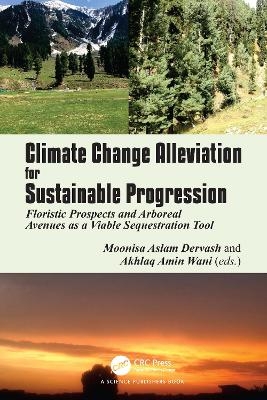
Climate Change Alleviation for Sustainable Progression
CRC Press (Verlag)
978-0-367-61891-9 (ISBN)
The change in climatic conditions has resulted in a series of events from the melting of polar ice to the rising of sea levels. This has affected low-lying coastal areas by endangering plants and animals, agriculture and livelihood patterns in general, not to mention causing the outbreak of diseases like dengue, malaria, etc. It is, thus, imperative that mitigation measures to stabilize or reduce the concentration of carbon dioxide is brought about. A key step is the bio-fixation of carbon from the atmosphere.
This book attempts to bring forth the role of vegetation in carbon sequestration. The introductory chapters of the book deal with the understanding of the physical attributes governing climate on earth, historical account of climate change, impacts of climate change on different environs and eco-strategies to combat climate change. Detailed account of mechanism of carbon sources and sinks, carbon credits and REDD+ are also discussed. A sizeable portion of the book is dedicated to the climate change and phonological variability, clean development mechanism and economic stability through natural resource management. Academicians, researchers, policy makers and environmental stakeholders will find it a useful and comprehensive guide in the floristic and arboreal potential to sequester carbon dioxide and will suffice the diverse needs of teaching and research.
Moonisa Aslam Dervash, Ph.D. Environmental Sciences, is an Assistant Professor in Sri Pratap College Campus, Cluster University Srinagar, Jammu and Kashmir, India. She has authored more than 30 research articles and book chapters and has published 6 books with reputable publishers. Her specialization is climatology & carbon sequestration, soil biology, medicinal plants, environmental biotechnology, sustainable agriculture and environmental education. Akhlaq Amin Wani, Ph.D. Forestry, is an Associate Professor in the Faculty of Forestry, SKUAST Kashmir India. He has 14 years of experience in forestry and is specialized in forest management involving remote sensing and GIS applications. He has published 80 research papers in reputed peer reviewed journals. He is on the review panel of reputed journals and organizations. He has executed several research projects and was recently awarded with European Commission Erasmus+ project partnership with University of Bremen Germany.
1. Physical Drivers of Earth’s Climate, 2. Global Warming or Global Cooling: Challenges and Future Prospects, 3. Global Climate Change Impacts on Watershed Hydrology, 4. Climate Change vis-à-vis Insect Pest Population, 5. Impact of Climate Change on Economic and Sociopolitical Aspects, 6. Climate Change, Biodiversity and Ecology of Caspian Sea: An Overview, 7. From Climate Change to Migration: The Prospects in Iran, 8. Mechanism behind Sources and Sinks of Major Anthropogenic Greenhouse Gases, 9. Soil Quality vis-à-vis Climatic Upheaval, 10. Climate Risk Management vis-à-vis Crop Productivity under Climatic Variability, 11. Organic Amendments for Sustainable Crop Production, Soil Carbon Sequestration and Climate Smart Agriculture, 12. Forests and Tree-based Land Use Systems: Mitigation and Adaptation Option to Combat Climate Change, 13. Climate Change and Plant Phenological Variability, 14. Climate Change and the Need for REDD+, 15. Clean Development Mechanism: Achievements, Challenges and Moving Beyond 2020, 16. Green Business through Carbon Credits, 17. Avenue Plantation as a Viable Carbon Confiscation Tool: A Blueprint for Eco-smart Cities, 18. Potential Role of Turfgrasses and Understorey Vegetation for Mitigating the Changing Climate
| Erscheinungsdatum | 05.07.2022 |
|---|---|
| Zusatzinfo | 34 Tables, black and white; 2 Line drawings, color; 30 Line drawings, black and white; 7 Halftones, color; 18 Halftones, black and white; 9 Illustrations, color; 48 Illustrations, black and white |
| Verlagsort | London |
| Sprache | englisch |
| Maße | 156 x 234 mm |
| Gewicht | 703 g |
| Themenwelt | Naturwissenschaften ► Biologie ► Ökologie / Naturschutz |
| Technik ► Umwelttechnik / Biotechnologie | |
| ISBN-10 | 0-367-61891-5 / 0367618915 |
| ISBN-13 | 978-0-367-61891-9 / 9780367618919 |
| Zustand | Neuware |
| Haben Sie eine Frage zum Produkt? |
aus dem Bereich


